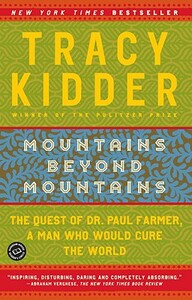Take a photo of a barcode or cover
I started getting involved with PIH earlier this year, so I thought it would be beneficial to read up on the people behind it all.
Farmer is quite the remarkable man, and it should be noted that Ophelia Dahl should get just as much recognition, perhaps even a share of the title.
Farmer is quite the remarkable man, and it should be noted that Ophelia Dahl should get just as much recognition, perhaps even a share of the title.
A good reminder for me as I grovel about my nonprofit career and what I’m supposed to do with my anthropology degree. There are things that will set me on fire but it’s not even about me at the end of it, is it? “People from our background — like you, like most PIHers, like me — we’re used to being on a victory team, and actually what we’re trying to do in PIH is make common cause with the losers. . . We want to be in the winning team, but at the risk of turning our backs in the losers, no, it’s not worth it. So you fight the long defeat.”
I thought this was a good book, but was not what I was expecting. I am used to books like Henrietta Laks or The Spirit Catches You which start with an ethical dilemma or a focused human interest story, and expand from there. While this book had some of that, I don't think it reads in a way that one could really take strong positions contrary to thinking that Paul Farmer is a pretty decent human being. Which is fine, and I enjoyed reading about him, his philosophy, and his works. The book got me thinking about ways we can all make micro changes towards good in our own lives, and I learned a lot about medical work and philanthropy in very underserved areas of the world. It just didn't get me as excited as those other books, which I found more thought provoking and which stayed with me long after I read them.
Dr. Farmer is an inspiration. He models how we should all be in the world. What a wonderful and enjoyable book. Kidder fabulously captures the essence of Dr. Farmer in this autobiography.
Okay, so I probably won't go save lives in Haiti by starting a massive public health project there, but it sure did inspire me to think big about what changes we can make in our world.
This book is very interesting. Paul Farmer works to fight the prevalence of infectious diseases such as tuberculous, HIV, and malaria in poor countries(mostly Haiti in this book). It shows how a difference can actually be made. Problems of sickness and malnutrition in poor countries seem so overwhelming at times. Why should anyone be dying of TB when we have the medicine for it now?? It is easy to sit back & think there is nothing I can do, but this man did the opposite of that and changed thousands of lives. The book can get slow at some parts, but even reading just the first half is eye opening.
Impressive on so many levels, from the reporting, to the story-telling, to characterization, to the narrative structure. Through the profile of Dr. Paul Farmer and his work in Haiti, Kidder tackles giant questions in approaches to social justice—and how cultural anthropology and science can work together to create lasting change.
That Haiti suffered the earthquake AFTER this book was published just kills me. Through Google I saw that Farmer published a book on the subject and is still at work. He's the real deal.
That Haiti suffered the earthquake AFTER this book was published just kills me. Through Google I saw that Farmer published a book on the subject and is still at work. He's the real deal.
Amazing story about Dr Paul Farmer and his work in treating tuberculosis in Haiti and other impoverished countries and areas. It took me a while to read the book. It didn't exactly suck me in, but I kept coming back to it. It is not a quick read, or at least it was not for me. But I really enjoyed it. The things Farmer has done and are doing is amazing and inspiring. It makes me really think about how I am living my life and what I can do to make a bigger impact on this world and the people in my life.





